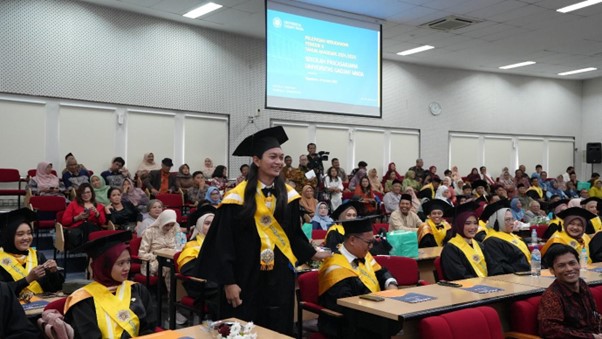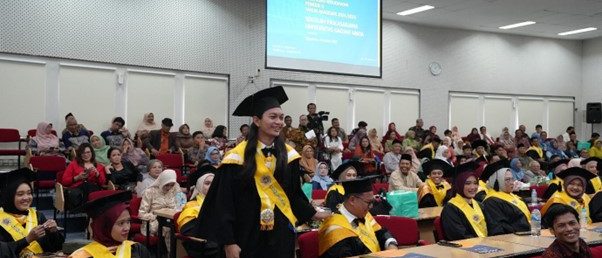
UGM alumni have a great responsibility, to think critically and uphold values to face the challenges of the times. It could be achieve by becoming youth who contribute with their works and dedication.
As we know, Indonesia is incredibly rich, but we often hear about disasters such as landslides. Additionally, we also encounter issues related to the management of natural resources.
This statement was made by the Dean of the Graduate School of UGM, Prof. Ir. Siti Malkhamah, M.Sc., Ph.D., during the graduation ceremony for the second batch of the academic year 2024/2025, which took place at the 5th-floor auditorium of the UGM Graduate School building on Thursday, January 23rd 2025.
Moreover, Prof. Malkhamah also highlighted the management of AI, particularly how to use AI wisely, as we frequently hear concerning and alarming news related to the use of gadgets, especially by children.
According to Prof. Siti, there are two solutions to these issues. The first is knowledge, and the second is character, which must be mixed. We need to foster a character that cares for the environment, society, and economy for sustainability, as well as a character that prioritizes the nation and its people.
Therefore, the Graduate School, as the manager of interdisciplinary programs, hoped to contribute to the nation through its alumni.
“Hopefully, the graduates will become the future of Indonesia, shaping character in their respective environments, whether at home, in the office, or in society, while also applying their knowledge to solve problems and create strategies together,” said Prof. Malkhamah.
In this batch, the Graduate School of UGM graduated 72 students, consisting of 61 Master degree graduates and 11 Doctoral graduates.
The fastest Master’s graduate was Dharma Putra from the Master’s Program in Leadership and Policy Innovation, who completed his studies in 1 year, 3 months, and 14 days. The average study duration was 2 years and 4 months.
The fastest Doctoral graduate was Yudi Sapto Pranoto from the Doctoral Program in Extension and Development Communication, with a study duration of 3 years, 1 month, and 14 days. In addition to the fastest study duration, Yudi also achieved the highest GPA of 4.00.
The youngest Master’s graduate was Ahmad Ghozali from the Master’s Program in Extension and Development Communication.
The youngest Doctoral graduate was Prisca Kiki Wulandari from the Doctoral Program in National Resilience Studies.
The highest GPA of 3.97 was achieved by Topan Bagus Permadi from the Master Program in Performing Arts and Fine Arts Studies.
This batch also saw the graduation of Double Degree students from the Master Program in Biotechnology and Master of Agriculture (Ibaraki University – Japan), who graduated with honors and a GPA of 3.77, achieved by Klara Khaisma Bunga Chandra.
This event is also aligned with the implementation of SDGs number 3, Good Health and Well-being; number 4, Quality Education; number 16, Peace, Justice, and Strong Institutions; and number 17, Partnerships to achieve the goals.
Writer: Arni Wistriatun
Editor: Ana Anggraini


